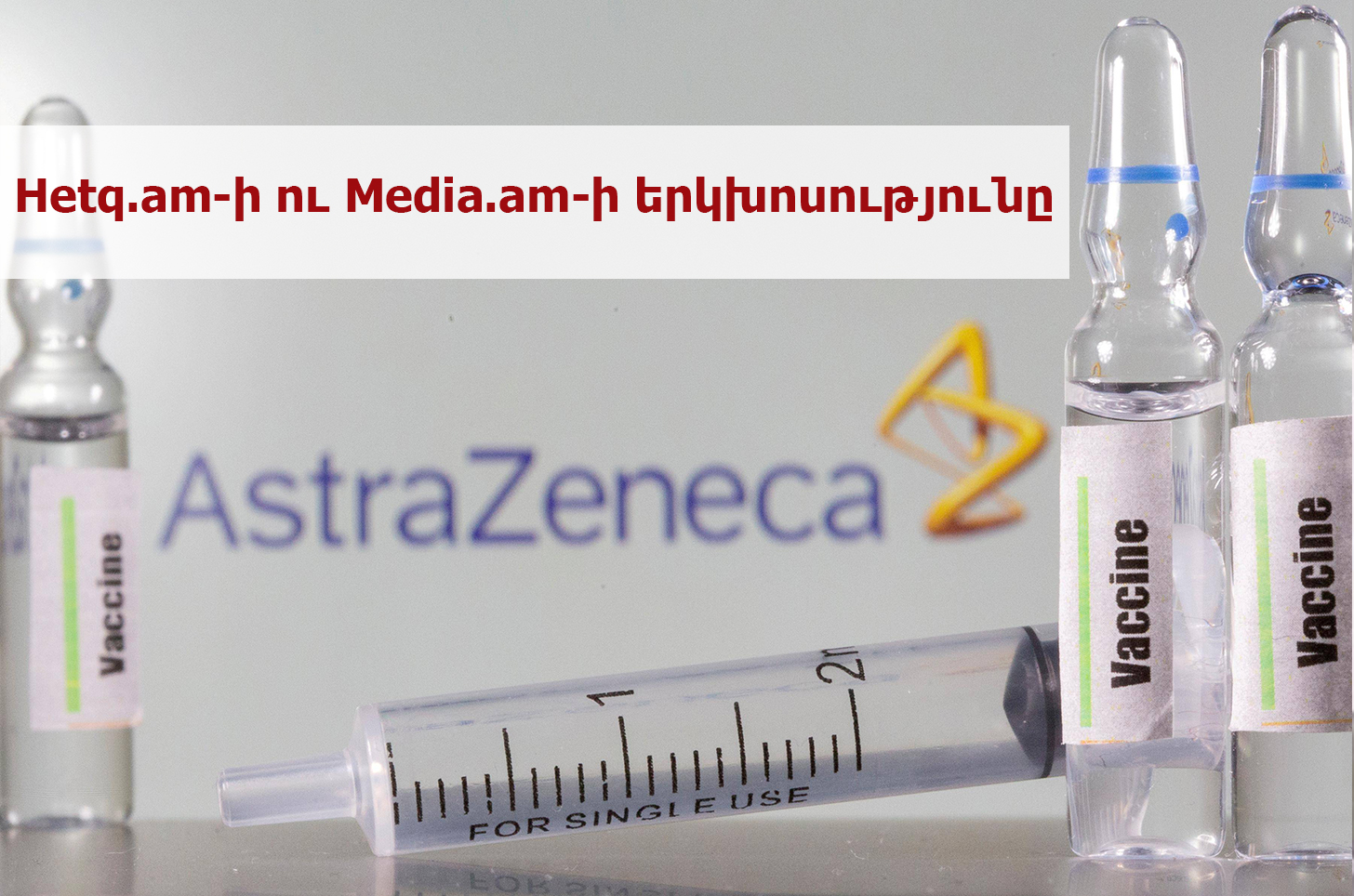On January 27, media.am made reference to the British AstraZeneca vaccine, which will be delivered to Armenia soon. The article spoke about what is known about that vaccine. The last part of the article referred to the controversial allegations published in the press, including one of hetq.am’s articles.
Hetq.am responded to media.am, also raising the issues that the website sees in the media.am publication. Let us present why we referred to the allegations in Hetq.am and detail the issues raised by Hetq.am about our publication.
Why did we consider the title of the Hetq.am article to be inaccurate?
The caption of the publication published on Hetq.am was: “1/3 of vaccinations in Armenia will be “AstraZeneca,” which has the efficiency of 70% and of which 6 people have died”
The author made two assertions in the title. Media.am especially emphasized the claim about the connection between deaths and the vaccine. We noted that in the original article, Hetq.am wrote that official sources do not establish such a connection.
The title, however, is a key component of the article: Readers can often see only the title and not read or not read the entire article. It is therefore important that the title does not contain inaccurate information, even if the information in the article is accurate.
We attach importance to the change of the title of the article by Hetq.am and the steps taken to keep the reader from possible misinterpretations.
Media.am did not refer to the second claim of Hetq.am headline about 70% efficiency separately. However, we acknowledge that the wording at the beginning of the article on media.am (it says “These allegations, however, were not entirely true”) may give the impression that Media.am checked Hetq.am’s claim, in particular, about 70% efficiency. Media.am changed the wording in this article.
Our explanation of the effectiveness of the vaccine was outside of the last portion about the press publications and was devoted to providing general information about the vaccine.
Secondary sources
Media.am emphasizes the use of primary sources of information. At the same time, secondary sources can contain useful explanatory material, offering the reader more detailed information that is not covered in said article.
Hetq.am mentions that we referred to the article of a secondary source, meduza.io, “Двум медработникам с Аляски стало плохо после введения вакцины Pfizer.” We do not know why the use of this link is attributed to us. There is no such link in Media.am’s publication as referred to by Hetq.am. There never was.
Our article uses other publications by meduza.io. Media.am has no requirement to refrain from using secondary sources. Each author decides for themself whether to use them or not.
Secondary sources provide additional information to the audience. For example, in our “Armenia Buys The AstraZeneca Vaccine: What Do We Know About It?” there was a link to the video “COVID-19 Vaccine 101: How Is Vaccine Effectiveness Measured” to explain the effectiveness of the vaccine that contains a simple visual explanation of how vaccine efficacy is calculated.
And how is the effectiveness of vaccines calculated?
In its response, Hetq.am does not consider Media.am’s explanation about the effectiveness of the vaccine accurate, making reference to the RA Law on Drugs.
Both media.am and hetq.am use the phrase “vaccine efficacy” in their articles. The terms “Efficacy” and “effectiveness” however, are different, which in this case is not reflected in the Armenian translation.
70% efficiency of AstraZeneca (which is also mentioned by Hetq.am in its response) shows the percentage of people who were vaccinated during the trials, which the vaccine protected against infection. This percentage is calculated in comparison with the percentage of those receiving placebo. In other words, this shows how low the infection rate is in the vaccinated group compared to the placebo group.
The definition of efficacy in the RA Law on Drugs as a “characteristic of the degree of manifestation of the expected positive effect of the drug” does not contradict Media.am’s explanation, as this definition is general and does not specify whether it is a separate organism, a group of volunteers for testing or the general population. It does not specify a specific term for vaccine test results.
Why did Media.am remark on the Hetq.am publication?
The mentioned article was published in the “Verified” section of media.am, where we study the inaccurate information in the press, social networks and public statements.
The purpose of fact-checking is to provide the public with more accurate information. We believe that fact-checking is important for all media outlets, and revealing inaccuracies contributes to the development of the entire media field.
We also value feedback and are always ready to hear feedback from readers and colleagues.
Karine Ghazaryan







